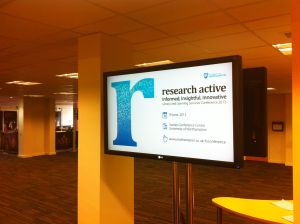 When we threw open an invitation to our colleagues to submit papers to the conference we couldn’t be certain of how they would respond. Like any other large department (there are 71 of us in LLS) it is entirely possible for staff in one team to be unaware of activity in another, especially if the paths of the two teams rarely cross. Indeed, the opportunity to share research findings across the department was one of the drivers for the conference.
When we threw open an invitation to our colleagues to submit papers to the conference we couldn’t be certain of how they would respond. Like any other large department (there are 71 of us in LLS) it is entirely possible for staff in one team to be unaware of activity in another, especially if the paths of the two teams rarely cross. Indeed, the opportunity to share research findings across the department was one of the drivers for the conference.
As it happened, the conference attracted submissions from all five teams: Learning Development; Learning Technology; Research Support; Collections and Learning Resources; and Service Development.
Colleagues were given a choice of four types of contribution:
- 30 minute research presentation – for projects substantially completed, and in most cases already disseminated through other conferences or publication.
- 15 minute ‘work in progress’ – for projects at the design or pilot stage. Presentation at the conference offers these projects the potential benefit of feedback from our target audience of service users and professional colleagues.
- ‘Minute madness’ presentation – just one minute to describe, explain, promote or otherwise share ongoing or completed work. Especially suitable for the silver-tongued quick talkers.
- Posters – ideal for smaller projects, or those best represented in graphical form.
In looking through the submissions, it immediately became clear that many colleagues are routinely engaged in research activity, evaluation and innovative practice. Moreover, a significant number were keen to talk about it. LIS practitioners are often accused of doing interesting research and then failing to disseminate it. Not so in Northampton. Nearly all the main speakers either have or will present their work at a national or international conference this year. (You can find out where on the individual presentation pages.)
In addition, colleagues are active in seeking funding to support their research. A number of the speakers here have received URB@N funding from the University of Northampton. This funding stream enables university staff to employ students as researchers – a benefit both to the students’ CV and to the service. Other speakers have won funding from the JISC, Sigma and from the Library and Information Research Group; indeed, two of our Academic Librarians, Hannah Rose and Gillian Siddall, were the winners of the 2011 LIRG Research Award.
The common thread throughout all of this activity is our emphasis on using research to inform our practice. All of our projects are designed to make a difference. That is why as practitioners we engage in research.
